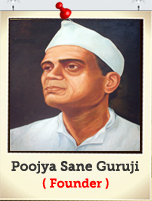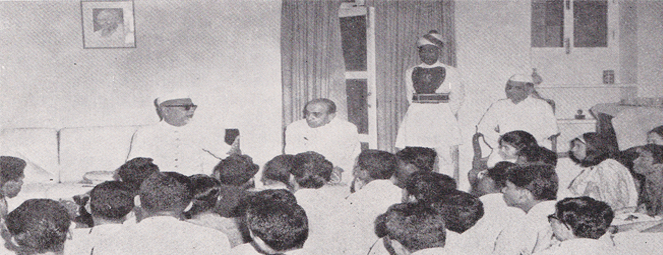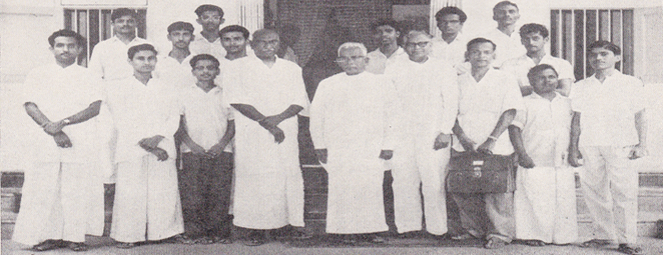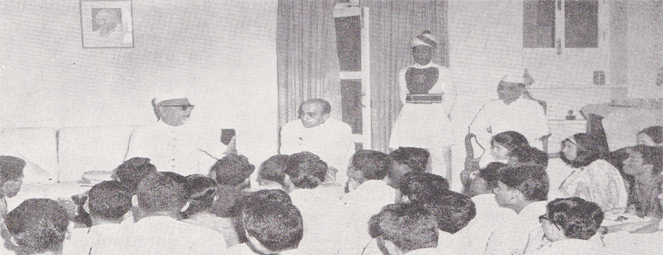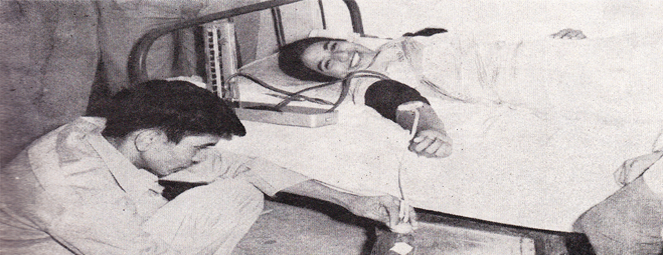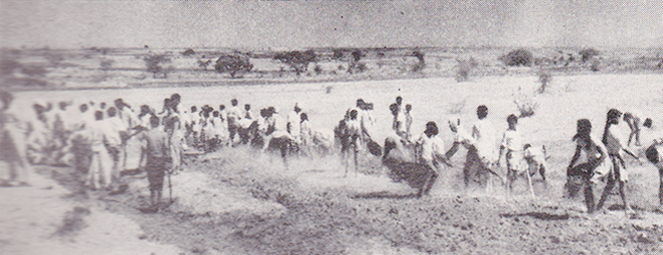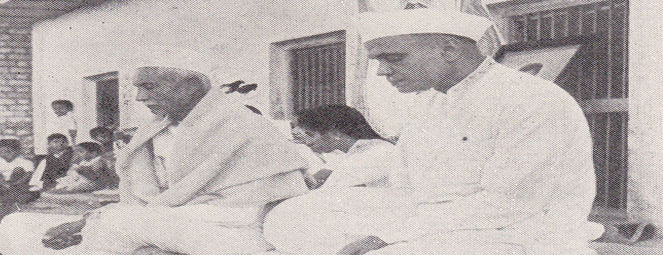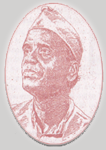1930 में, साने गुरुजी त्रिचनापल्ली जेल में थे। उस समय वे दक्षिण भारत के अनेक लोगों के संपर्क में आए। उन्होंने अनुभव किया कि अनेक भाषाओं की महिमा से हम अपरिचित हैं। हम भारत में रहते हुए भी यहाँ के विभिन्न क्षेत्रों में बोली जानेवाली भाषाएँ नहीं जानते। साने गुरुजी को हमेशा इस बात का मलाल रहता था कि, हमारे पास इन भाषाओं को सीखने के लिए ऐसी कोई संस्था नहीं है। यहीं से अंतरभारती की अवधारणा का जन्म हुआ।
जैसा कि उन्हें लगा कि, प्रांतवाद भारत की एकता में बाधक होगा, उन्होंने अंतर-भारती के साथ प्रयोग करने का फैसला किया, ता कि क्षेत्रीय घृणा दूर हो और मैत्रभाव का माहौल बढ़े, विभिन्न प्रांतों के लोग एक-दूसरे की भाषा सीख सकें और समझ सकें, एक दूसरे के रीति-रिवाज। अ.भा.मराठी साहित्य सम्मेलन में इसी प्रस्ताव पर बोलते हुए उन्होने कहा था कि, ‘रवींद्रनाथ टैगोर के शांतिनिकेतन की तरह विभिन्न प्रांतीय भाषाओं को सीखने के इच्छुक छात्रों के लिए कुछ सुविधा की जानी चाहिए।' इसके लिए उन्होने कुछ पैसे भी जमा किए थे। लेकिन उन की जिंदगी में वह काम पुरा नही हो सका, 11 जून 1950 को उन्होंने इस दुनिया से बिदा ली।
साने गुरुजी कहा करते थे कि, प्रत्येक भारतीय को अपनी मातृभाषा छोड़कर दूसरी भारतीय भाषा सीखनी चाहिए। इसी उद्देश्य से उन्होंने अंतरभारती की अवधारणा का प्रस्ताव रखा। साने गुरुजी का संक्षिप्त परिचय-
साने गुरुजी का नाम पांडुरंग सदाशिव साने था। गुरुजी का जन्म 24 दिसम्बर 1899 को महाराष्ट्र के कोंकण में रत्नागिरी जिले के पालगढ़ गांव में हुआ था। वह अपनी मां की शिक्षाओं से काफी प्रभावित थे। उन्होंने अंग्रेजी साहित्य में एम.ए. किया था।
1924 से 1930 छह साल तक प्रताप हाईस्कूल, अमलनेर, (जिला जलगाँव) में एक शिक्षक के रूप में काम किया। प्रताप हाईस्कूल के छात्रावास के प्रभारी होने पर उनके अंदर के शिक्षक को अधिक मौका मिला। उन्होंने दर्शनशास्त्र का भी अध्ययन किया। 1928 में उन्होंने 'विद्यार्थी‘ नामक पत्रिका प्रारंभ की। वे महात्मा गांधी के विचारों से बहुत प्रभावित थे। वे स्वयं खादी का प्रयोग करते थे। 1930 में, उन्होंने एक शिक्षक के रूप में अपनी नौकरी छोड़ दी और सविनय अवज्ञा आंदोलन में भाग लिया। उन्होंने ‘कांग्रेस' नामक साप्ताहिक निकाला। सूखे के दौरान किसानों को टैक्स में छूट दिलाने की कोशिश की। उन्होंने जलगाँव जिले के फैजपुर में कांग्रेस अधिवेशन (1936) को सफल बनाने के लिए बहुत काम किया। उन्होंने महात्मा गांधी की विचारधारा पर चलते हुए शौच ढोना और गांव की सफाई का काम किया। 1942 के आंदोलन में वे भूमिगत हो गए और स्वतंत्रता के लिए अभियान चलाया। साने गुरुजी ने ‘राष्ट्र सेवा दल की' स्थापना की।
साने गुरुजी की देशभक्ती की कविताएं उनके पहले कविता संग्रह पत्री में प्रकाशित हुई। इसमें ‘बलसागर भारत होवो' जैसी कविताओं का नागरिकों पर बढ़ता प्रभाव को देख कर ब्रिटिश सरकार ने उस कविता संग्रह की प्रतियां जब्त कर लीं थी। किसानो की मुक्ती के लिये उन्होने कई गीत लिखे।
साने गुरुजी ने हमेशा जाति-धर्म के भेदभाव, अस्पृश्यता जैसे समाज में अवांछनीय रीति-रिवाजों और परंपराओं का विरोध किया। उन्होंने 1947 के दौरान अनुसूचित जाती के लोगो को सोलापुर जिले के पंढरपुर के विठ्ठल मंदिर में प्रवेश दिलाने के लिए महाराष्ट्र का दौरा किया। अंत में, इस मुद्दे पर उपवास का मार्ग अपनाया और सफलता प्राप्त की। 1948 में ‘साधना' साप्ताहिक प्रारंभ किया।
स्वतंत्रता के बाद उन्होंने अंतर-भारती आंदोलन के माध्यम से भारत को एकजुट करने का प्रयास किया। उन्होंने स्वयं तमिल, बंगाली और अन्य भाषाएँ सीखी थीं। उनकी कहानियों, उपन्यासों, लेखों, निबंधों, जीवनियों, कविताओं के माध्यम से हम उनकी साहित्यिक संवेदनशीलता को देख सकते हैं। उन्होंने कुल 73 पुस्तकें लिखीं। अधिकांश लेखन जेल में रहते हुए किया। नासिक जेल में रहते हुए प्रसिद्ध उपन्यास ‘श्यामची आई‘ लिखा। आचार्य विनोबा भावे की ‘गीताई' का शब्दांकन साने गुरुजी ने धुलिया जेल (1932) में किया। साथ ही, बैंगलोर में जेल में रहते हुए, उन्होंने कवि तिरुवल्लीवर का तमिल महाकाव्य ‘कुराल' का मराठी में अनुवाद किया। फ्रांसीसी उपन्यास ‘लेस मिसरेबल्स' का मराठी में ‘दुक्खी' शीर्षक के साथ अनुवाद किया। विश्व प्रसिद्ध मानव विज्ञानी हेनरी थॉमस की पुस्तक ‘मानव जाति की कहानी' का मराठी में अनुवाद किया। उन्होंने ‘भारतीय संस्कृति' नामक पुस्तक लिखी जो भारतीय संस्कृती का वास्तव दर्शन कराती है। ‘शाम की मां' पर विख्यात पत्रकार प्रल्हाद केशव अत्रे ने फिल्म बनाई जिस की काफी स्ररहाना हुई। गुरुजी द्वारा लिखित कविता ‘खरा तो एकची धर्म, जगला प्रेम अर्पावे' उन के जीवन का सूत्र माना जाता है। यह गीत मराठी स्कूलों में प्रार्थना के रूप में गाया जाता है।
आंतरभारती आंदोलन-
लागभाग 75 वर्ष पूर्व साने गुरुजीने जो बीज बोया था, आज उस का वृक्ष बन गया है। यदुनाथ थत्ते, डॉ. सुब्बाराव, प्राचार्य सदाविजयजी आर्य जैसे दिग्गजोंने बडे परिश्रम से आंतरभारती को सिंचा है। आंतरभारती ना केवल एक रजिस्टर्ड संस्था (E-195) है बल्की यह एक आंदोलन है। मानवता को रोकने वाली दिवारों को ध्वस्त करनेवाला तथा आपसी स्नेह को बल देनेवाला आंदोलन है। जाती-धर्म का भेदभाव मिटाना है-
जाती या धर्म के कारण किसी से द्वेश करना, मानवता को क्षति पहुंचाना है। यह दिवार तोडने के लिये हम मानवी विवाहों (आंतरजातीय और आंतरधर्मीय) का समर्थन करते हैं। उन्हे बढावा देना मानवता के हित में है। आंतरभारती सेक्युलर समाज के निर्माण का प्रयास करती है। तथाकथित धर्माधिष्ठीत राज्य का हम विरोध करते हैं। हृदय की वाणी में विश्वास करते हैं। एक भाषा और सीखो-
आंतरभारती के आजीवन सदस्य को मातृभाषा के अतिरिक्त कम से कम एक और भारतीय भाषा सीखनी चाहिये। इस के लिये आंतरभारती मोहीम चला रही है। अन्य भाषा सीखने की सुविधा उपलब्ध कराना आंतरभारती ने अपना दायित्व माना है। आंतरभारती दिन-
10 मई को पंढरपूर के विठ्ठल मंदिर का द्वार सब के लिये खोला गया था. इस के लिये साने गुरुजी ने दस दिन अनशन किया था। एक बडे भेदभाव की दिवार जिस दिन ध्वस्त हुई, उस 10 मई को हम आंतरभारती दिन मानते हैं। उसी दिन आम सभा होती है। सर्जकों की आजादी-
शिवाजी महाराज, म. फुले, म. गांधी आदी अनेक महात्माओंने किसान और नारी की आजादी को प्राथमिकता दी है। यह दोनो घटक सर्जक हैं। आज देश में किसान आत्महत्या और नारी की भ्रूणहत्या हो राही है। ऐसी स्थिती में हम किसान और नारी की आजादी का समर्थन करते है। जाती-धर्म या मालिक-मजदूर के संघर्ष से गंभीर संघर्ष, किसान और औरतों के मुक्ती का अर्थात सर्जको का संघर्ष हैै।
निर्दलीय आंदोलन-
आंतरभारती निर्दलीय आंदोलन है। हमारा किसी भी राजनैतिक दल से संबंध नही है। हम गांधी के सिद्धांतों पर चलने वाले लोग हैं। म. गांधीने कहा था, ‘मानवी जीवन में सत्ता का दखल कम से कम हो।' इस बात को हम पुरी तरह स्वीकार करते हैं और व्यक्ती की स्वतंत्रता को प्रधानता देते हैं। इसी लिये हम कृषी, महिला, बालक, शिक्षण, अंधश्रद्धा निर्मुलन, पर्यावरण आदी अन्य क्षेत्रो में काम करते हैं।
आंतरभारती की रचना-
आंतरभारती की आजीवन सदस्यता फीस एक हजार रुपये है। जिस जगह कम से कम 11 आजीवन सदस्य होंगे वहां आंतरभारती की शाखा (unite) शुरू की जा सकती है। शाखा के पदाधिकारीयों के चुनाव के लिये ट्रस्ट की मंजुरी आवश्यक होगी। जिन राज्यो में एक भी शाखा नही होगी, वहां ट्रस्ट अस्थाई संयोजक या संयोजक मंडल नियुक्त कर सकता है। राज्य में तीन शाखा शुरू होन के बाद अस्थाई संयोजक या संयोजक मंडल विसर्जित हो जायगा।कार्यविस्तार हेतू आंतरभारती दूत नियुक्त किये जाते हैंैं।
नयी दिशा- नया कदम-
आंतरभारती में सतत विचार मंथन होता है. इस के लिये हर वर्ष एक चिंतन शिबीर का भी आयोजन किया जाता है। शिबीर न हो तो बैठक की जाती है। आंतरभारती का प्रयास रहता है की, जो काम और कोई नही करता, वह सही काम स्वयं करे। जो सही काम और लोग कर रहे है, उन का हात बटायें। नयी दिशा में नया कदम उठाने की चाह आंतरभारती को चैतन्यमय रखती है। इसी कारण आंतरभारती की शाखायें अपना वैशाष्ट्यपूर्ण कार्यक्रम करती आ रर्हीं हैं।
आंतरभारती का बाल आनंद महोत्सव एक महत्वपूर्ण कार्यक्रम है। इसी के साथ शिक्षको, युवाओं, महिलाओं के साथ कई कार्यक्रम किये जाते है। ‘भारत ंजोडो' के लिये आंतरभारती कार्यरत है।
जनसंपर्क-
आंतरभारती मासिक पत्रिका हम सब को जोडने का माध्यम रहा है। इस के द्वारा विविध कार्यक्रमों की जानकारी मिलती है। साथ ही वैचारिक लेख, कवितायें छापी जाती हैं। जनसंपर्क के लिये सोशल मिडिया का भी इस्तेमाल किया जाता है। फेसबुक, व्हाट्सअप पर कई ग्रुप्स काम कर रहे हैं। कोविड के जमाने में इन ग्रुपों ने सराहानीय कार्य किया था। आंतरभारती की वेब साईट भी कार्यरत है।
संपर्क-
अध्यक्ष- पांडुरंग नाडकर्णी (पणजी)- 9326139252कार्याध्यक्ष- अमर हबीब (आंबाजोगाई)- 8411909909
उपाध्यक्ष- संगीता देशमुख (वसमतनगर)- 9975704311
सचिव- डॉ. डी. एस. कोरे (पुणे)- 8007702601
कोषाध्यक्ष- डॉ. उमाकांत चनशेट्टी (सोलापूर)- 9420488874
संपादक- डॉ. जयशंकर बाबू (पोद्दीचेरी)- 9442071407
सदस्य- प्रतापसिंह डांगी (इंदोर)- 9425353831
कुमार शुभमूर्ती (बिहार)- 7782965995
मनीषा राणी आर्य (हैद्राबाद)- 9347228372
आनंद मोहनजी माथुर (इंदोर) 9826038765.
He said : "While I was in Trichanapally jail, Shri Venkatachalam was about to be released. He was a science graduate and a good student of Tamil, Telugu and Mala-yalam. How nice it would be if Shri Venkata¬chalam could be employed as a teacher in our school. We already have a Bengali teacher. With the addition of Shri Venkata¬chalam our school would become a symbol of Indian unity. How nice would it be if we have in the school a teacher from every province, so that we shall become familiar with all the languages spoken in the country and come to know its people! Ever since then I have been dreaming of an institution which will teach us the basic unity of India.
"We talk of an undivided and one India but we know precious little about it. Where is the feeling that this land and all its people are mine, all their languages are mine, that I shall learn and get to know them. In places like Bombay there are institutions which teach German, French, Russian but no¬where is there an institution where we can study all the Indian languages.
"That is why I am, for many years, dream¬ing the dream of Antar Bharati, where teachers and students from all provinces will get together and hear and learn the different languages of the country. There will be a library of each language and books from one language will be translated into others and everyone will get to know the country and its people.
"Rabindranath Tagore was a poet who belonged to the whole world and he established at Shantiniketan, Vishwa Bharati, the great centre of world learning. India is a part of the world in which there is neither East nor West. The world is round and 13harat which is a part of the world has to understand that world of which it is a part. Hence Vishwa Bharati is a place where the world becomes a nest.
"But to understand the world in all its manifestations, we must first understand our own country and our own people. The various provinces of India are unfamiliar with one another's life, literature, language and culture. Antar Bharati will bring this about, will fill up this gap in our national consciousness through the medium of love and devotion. It will honour all the great men of India and make us familiar with our great national heritage. Antar Bharati will thus become a fountain-head of that new India which is about to be born. I have all the while before my eyes this fascinating dream.
"Antar Bharati will not just be a place for learning Indian languages, it will be a pro-totype of all the multifarious streams of thought and endeavour which are at the base of our culture. It will be a place of joy and happiness, of service, of generosity, of knowledge, of science, of arts and letters.
"I want to see people of all states, all communities, all castes and religions meet-ing and helping each other with love and affection, observing different experiments carried on in different parts of the country, helping and getting help, inspiring and receiving inspiration. I want to hear in and through Antar Bharati's multifarious acti-vities, the mysterious music of Bharat.
"On the base of linguistic provinces we have to raise the superstructure of the Indian Union. This will be possible only if the various provinces live in a spirit of love and co-operation and not become victims of narrow provincial loyalties and jealousies. God is described as having a thousand heads and a thousand eyes. He is never described as .having a thousand hearts. In the same way India may have a thousand eyes and heads but its heart must be one.
"Our regional loyalties must not inter¬fere with our national loyalties just as our national loyalties must expand outward into international loyalties. Antar Bharati and Vishwa Bharati are our two ideals. Antar Bharati will try to bind together by the silken chords of love all the different provinces which will together respond to the irresistible appeal of a united India.
This is one ideal of Antar Bharati. The other ideal will be that of Vishwa Bharati so ably propounded by Tagore. A great country like India cannot remain great if its people raise walls of separatism around them. A great country and little minds go ill together. We must put into the perspective of an expanding vision the region, the country and the whole world. There can be no Vishwa Bharati without Antar Bharati and there can be no Antar Bharati without men and women of vision and understanding scattered all over the land.
"Will my countrymen help me to realise this dream? Will they put in my beggar's bowl the priceless gift of a dream come true ?"
On 11th June 1950, Sane Guruji ended his life and his friends decided to carry on from where he had left. With the blessings of such persons as Vinobaji, Acharya Narendra Deo, Acharya Kshitimohan. Sen, Shri Jainendra Kumarji, Shri Moturi Satyanarayan of Tamil Nadu, Shri Umashankar Joshi of Gujarat, Masti Venkatesh Iyengar of Karnatak, a Trust to commemorate the memory and continue the work of Sane Guruji was founded. In explaining the nature of the activities of the Trust, the then Director of Antar Bharati, Acharya Bhagwat said, "Antar Bharati is a cultural movement. Its main purpose will be to bring into inti¬mate contact different people and different language groups in the country. It will encourage the study of all Indian languages and different Indian art forms. It will build a house of friendship where writers, artists, from all over the country will come and stay together and cultivate the idea of a common Indian consciousness, on which will rest the superstructure of one world.
"Antar Bharati will be free of all political affiliations but it will try to influence politics in the direction most suitable for the pro-pagation of its ideals."
The first Antar Bharati centre was opened on 30th November, 1952 at the hands of Masti Venkatesh Iyengar. Dr. M. R. Jay-kar, Vice-Chancellor, Poona Univerisity, presided over the function. Mastiji spent a week in Poona and made intimate contacts with various institutions and individuals in Poona. He also visited Sangli and Sholapur.
In 1953 Urdu and Bengali classes were started both in Poona and Bombay.
Antar Bharati published a few books on Bengali and Urdu poets and a book on the ancestry of Marathi language and culture. It also brought out a primer of Kannad language. Different language groups in Poona were contacted for a regular get- together. It was also decided to celebrate the Rabindranath Tagore day.
In 1950 the Service Corps— Seva Pathak was organised for carrying the message of Antar Bharati to the villages.
A story-telling programme specially meant for children and known as Sane Guruji Katha Mala was launched by Shri Prakash Mohadikar, who had the good fortune of spending part of his childhood with Sane Guruji, a great story-teller himself. The purpose of the programme was to bring the old and the young together and break down the barriers that seemed to separate them. Shri Jayaprakash Narain was so impressed by one of the sessions he attended that he recommended all other states to copy it.
In June 1960, Antar Bharati Biradari was established in Hyderabad followed by similar clubs in Belgaum, Ratnagiri, Jamkhindi and other places.
Shri Shriprakashji, the then Governor of Maharashtra met the workers of Antar Bharati at a special programme arranged in his honour. He was very pleased with the work done and suggested the setting up of similar organisations in all states of the Union.
In August 1960 there were riots in Assam and the slogan of 'Assam for Assamese' was raised. Shri Raosaheb Patwardhan spentone month in Assam impressing upon the people the need to develop the spirit of Antar Bharati. A special anti-provincial¬ism week was organised from 4th to 11th September 1960.
In 1961 a Kannad language class was conducted in Poona. The Chief Minister of Maharashtra showed his appreciation of the work done by releasing Rs. 1,000/- from his discretionary fund for the purpose.
It was decided to start a periodical `Antar Bharati' in Hindi, which is now being pub-lished from Poona.
In 1962 Prof. Vasant Bapat who was closely associated with Sane Guruji during the freedom struggle and afterwards, was sent on a year's tour of the country. This idea of Bharat Darshan was an extension activity of Antar Bharati and Prof. Bapat was eminently suited for the job. A well- known poet and writer in Marathi and a close associate of Sane Guruji, he has already composed and put on the stage a most successful programme of Bharat Darshan.
In 1964 anti-Hindi agitation started in Madras. To understand the mind of the South a batch of young men were given special instruction in Tamil language and culture and sent to Madras.
The Sadhana Trust itself is a creation of Sane Guruji and is closely associated with Antar Bharati. The ‘Sadhana' weekly has made it a point to publish in its annual Diwali issue selected stories from other languages. Sadhana also brings out a special children's number in memory of Sane Guruji. It tries to communicate through pictures, and under a special section devoted to the purpose, gives information about children and their activities in other parts of the country. In co-operation with the Sahitya Academy, Sadhana brought out an album of fourteen famous writers from different languages. It is hoped that every school will keep a copy of the album in the school. It is proposed to bring out similar albums of artists, musicians, painters from all the States of the Union.
In May 1966 friends of Gujarat invited Maharashtriyan friends for a three days stay in_ Ahmedabad. The programme was a great success. Various topics of common interest were discussed with writers, educa¬tionists, artists and others.
In August 1966 some forty friends from Gujarat and Karnatak visited Poona and stayed as guests with different families. They left with the hope that many similar get-togethers would be organised in future.
Gulbarga in Karnatak is a border townmost suitable for promoting the spirit of Antar Bharati. In November, 1966 the citizens of Gulbarga invited Raosaheb Patwardhan to the city and this visit was a great success.
The programme of youth community living was sponsored and a batch of students from Maharashtra visited Gujarat during the Diwali holidays. Similarly 15 students from Karnatak visited Poona for a week and went back thoroughly convinced of our affection and goodwill.

